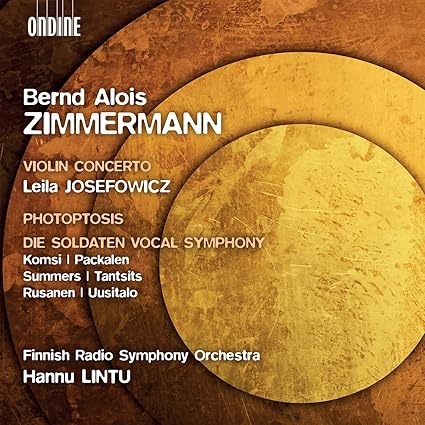Briefly Noted: Zimmermann's Violin Concerto
 B. A. Zimmermann, Violin Concerto / Photoptosis / Die Soldaten Vocal Symphony, L. Josefowicz, A. Komsi, J. Packalen, V. Rusanen, H. Summers, P. Tantsits, J. Uusitalo, Finnish Radio Symphony Orchestra, H. Lintu (released on February 8, 2019) Ondine ODE1325-2 | 73'45" |
Leila Josefowicz is incendiary on the solo part of the Violin Concerto. Although the work has been recorded before, she plays it with an arresting immediacy and restless edge, not lingering over the middle movement, for example, as long as Thomas Zehetmair did over a decade earlier in his recording. The second movement is positively surreal, especially the slightly creepy passage for violin solo over celesta, and Zimmermann's menacing quotation of the Gregorian sequence Dies Irae, heavily clustered with dissonance.
It is paired here with the tone poem Photoptosis, a late work for large orchestra before the composer's suicide in 1970, after years of health problems and depression. Inspired by the vibrant blue paintings of Yves Klein, it is a hallucinogenic exploration of clashing dyads, including a sunburst of sound that introduces several quotations from other composers. The first is the "chaos chord" from Beethoven's Ninth Symphony, the simultaneous sounding of all twelve notes of the chromatic scale, a nod to Zimmermann's unconventional use of the 12-tone technique here and throughout his oeuvre.
Zimmermann reworked his violent opera Die Soldaten as a compact vocal symphony, about 40 minutes in length. This disc offers a rare recording of this symphony, but it is essentially just excerpts that represent the dramatic arc of only the first two acts, using just six characters spread throughout the human vocal range. Therefore it climaxes, so to speak, with the ensemble scene combining the wordless love scene of Marie and Desportes, to one side, with the conversation of Stolzius and the old ladies on the other. Soprano Anu Komsi displays considerable vocal strength as Marie Wesener as does bass Juha Uusitalo as her father.





















































No comments:
Post a Comment